Case Law Details
Reverse Age Health Services Pte Ltd. Vs DCIT (ITAT Delhi)
ITAT Delhi held that the provisions of a DTAA (Double Taxation Avoidance Agreement) supersedes the provisions of the income tax Act in case their application is more beneficial.
Facts- Return of the assessee was selected for complete scrutiny because of the high ratio of refund of TDS. The tax deducted at source by M/s. VIC Enterprises Private Limited was on account of sale consideration of the sale of shares of Dr. Fresh Healthcare Private Limited by the assessee. These shares were acquired by the assessee on 22.08.2016 and were sold on 02.01.2018 giving rise to STCG of Rs.1,92,63,473/-.
The assessee claimed that STCG which has arisen due to sale of shares of Dr. Fresh Healthcare Private Limited are not taxable as per Article 13 of India – Singapore DTAA, therefore, the entire TDS of Rs.10939285/- has been claimed as refund.
The AO/ DRP denied the assessee the benefit under Article 13 (4A) of the India – Singapore DTAA on the ground that the assessee had no economic substance or commercial substance and that it was a “shell” or a “conduit” company. For this purpose, Article 3 (1) of the 2005 protocol to the India- Singapore DTAA was invoked (which is now incorporated as Article 24A(1) of the India- Singapore DTAA) and, therefore, STCG of Rs.1,92,63,473/-was held to be taxable in India in the hands of the assessee.
In taking this action against the assessee the AO and the DRP have ignored completely the tax residency certificate of the assessee issued by Singapore Tax Authority, the tax assessments carried out by the Singapore Tax Authority pertaining to year assessment between 2016 and 2018 and the financials for the assessee of the 3 years ending 31.03.2016, 31.03.2017 and 31.03.2018.
The core issue that arises for consideration in the present appeal is whether the revenue can go behind the tax residency certificate issued by the other tax jurisdiction?
Conclusion- At this point it has to be understood clearly that the supremacy of law made by the Parliament is beyond any doubt. However, one of the recognised exceptions to the said rule is section 90(2) of the Act which can be termed as treaty override provision as held by the Hon’ble Supreme Court in the case of Azadi Bachao Andolan (2004) 10 SCC 1 and, therefore, this provision allows the provisions of a DTAA to supersede the provisions of the income tax Act in case their application is more beneficial.
To conclude it is not in dispute that the assessee has furnished a valid tax residency certificate issued by Inland Authority of Singapore, audited financial statements and return of income filed alongwith tax assessment orders by Singapore Tax Authority, therefore, in the light of the binding decision of the Hon’ble Jurisdictional High Court of Delhi in the case of Black Stone Capital Partners (supra) we direct the AO to delete the impugned disallowance and allow the treaty benefit to the assessee as per the relevant provisions of the law/treaty. The grounds addressed before us are allowed.
FULL TEXT OF THE ORDER OF ITAT DELHI
This appeal by the assessee is preferred against the order dated 18.07.2022 framed u/s.143 (3) r.w.s. 144 C (13) of the Act.
2. Though the assessee has raised as many as 34 grounds of appeal but at the very outset the Counsel for the assessee fairly stated that he would be contesting ground No.9, 17,21 24 and 26 which read as under :-
9. That the AO/DRP grossly erred in denying the appellant he benefits of India- Singapore Double Taxation Avoidance Agreement (“DTAA) and bringing to tax the short-term capital gains of INR 1,92,63,473/- earned by the Appellant during AY 2018-19 as chargeable to tax in India.
17. That the AO/ DRP erred in not appreciating that even if transfer of shares of DFHPL was undertaken directly by the shareholders and / or the alleged beneficial owner, the benefit of Article 13 (4A) of the DTAA would come into operation, since the shareholders and / or the alleged beneficial owner were tax residents of Singapore, and therefore, it cannot be held that the affairs of the Appellant were arranged with the primary purposes to take advantage of the benefit in Article 13 (4A) of the DTAA.
21. That the AO/ DRP erred in denying the benefit of Article 13 (4A) of the DTAA to the Appellant qua capital gains earned by the Appellant on transfer of shares of DFHPL in complete disregard to the fact that the investments in DFHPL were made by the Appellant in 2016 and income arising on transfer thereof was specifically exempt from purview of General Anti-Avoidance Rule as contained in Chapter X-A of the ITA read with Rule 10 U (1) (d) of the Rules.
24. That the AO / DRP erred in denying the Appellant the benefit of Article 13 (4A) of the DTAA in disregarded to Rule 10U (1) (a) of the Rules, which exempts arrangements having tax benefit not exceeding INR 3,00,00,000/- from the purview of General Anti-Avoidance Rule contained in Chapter X-A of the ITA.
26. That the AO/DRP erred in ignoring that the exemption from the applicability of the General Anti-Avoidance Rule, as contained in Chapter X-A of the ITA read with Rule 10U (1) (a) and or / (d) of the Rules, had an overriding effect over Article 24A of the DTAA, by virtue of section 90 (2A) of the ITA.
3. Representatives of both the sides were heard at length. Case records carefully perused. The relevant documentary evidences brought on record in the form of paper book duly considered in the light of Rule 18 (6) of the ITAT Rules.
4. Facts emanating from the record show that return of the assessee was selected for complete scrutiny because of the high ratio of refund of TDS. The tax deducted at source by M/s. VIC Enterprises Private Limited was on account of sale consideration of the sale of shares of Dr. Fresh Healthcare Private Limited by the assessee. These shares were acquired by the assessee on 22.08.2016 and were sold on 02.01.2018 giving rise to short term capital gains of Rs.1,92,63,473/-.
5. The assessee claimed that the short term capital gain which has arisen due to sale of shares of Dr. Fresh Healthcare Private Limited are not taxable as per Article 13 of India – Singapore DTAA, therefore, the entire TDS of Rs.10939285/- has been claimed as refund.
6. The AO/ DRP denied the assessee the benefit under Article 13 (4A) of the India – Singapore DTAA on the ground that the assessee had no economic substance or commercial substance and that it was a “shell” or a “conduit” company. For this purpose, Article 3 (1) of the 2005 protocol to the India- Singapore DTAA was invoked (which is now incorporated as Article 24A(1) of the India- Singapore DTAA) and, therefore, short term capital gain of Rs.1,92,63,473/-was held to be taxable in India in the hands of the assessee.
7. In taking this action against the assessee the AO and the DRP have ignored completely the tax residency certificate of the assessee issued by Singapore Tax Authority, the tax assessments carried out by the Singapore Tax Authority pertaining to year assessment between 2016 and 2018 and the financials for the assessee of the 3 years ending 31.03.2016, 31.03.2017 and 31.03.2018.
8. The core issue that arises for consideration in the present appeal is whether the revenue can go behind the tax residency certificate issued by the other tax jurisdiction ?
9. At this stage it would be pertinent to refer to the decision of the Hon’ble High Court of Delhi in the case of Black Stone Capital Partners, Singapore in W.P.(C) 2562/2022 decided on 30.01.2023 and the most relevant observations of the Hon’ble High Court pertinent to the facts of the appeal under consideration read as under :-
“73. In the objections dated 28th December, 2021, the petitioner has furnished the details of compliance with the LOB clause to the India-Singapore DTAA. The Assessing officer has not questioned the satisfaction of the LOB clause or the Independent Chartered Accountant certificate at any stage except in the present proceedings. Consequently, the petitioner is a bonafide entity and not a shell/conduit entity as it complies with the LOB clause to the India-Singapore DTAA as the expenditure has been incurred in Singapore and the same has been certified by an independent chartered accountant and accepted by the authorities in Singapore i.e. Income Tax authorities, Monetary Authority of Singapore. Accordingly, the allegation of treaty shopping is irrelevant in the present case as the India-Singapore DTAA has a limitation of benefit clause which the petitioner satisfies RESPONDENT-REVENUE CANNOT GO BEHIND THE TRC
74. This Court is in agreement with the argument of learned senior counsel for the petitioner that the entire attempt of the respondent in seeking to question the TRC is wholly contrary to the Government of India’s repeated assurances to foreign investors by way of CBDT Circulars as well as press releases and legislative amendments and decisions of the Courts in Union of India v. Azadi Bachao Andolan (supra) Vodafone International Holdings B.V. (supra), Commissioner of Income-tax (International Taxation)-3, Mumbai v. JSH (Mauritius) Ltd., (2017) 297 CTR 275 (Bom) and Sanofi Pasteur Holding SA (supra).
75. In fact with the increased expansion of international trade and * commerce after the Second World War, the taxation of cross border transactions has been a critical challenge for both Parliament and the Courts.
76. It is a fundamental rule of international taxation that every nation has a sovereign right to impose tax on the global income of its residents and on income that accrues or arises within its territorial limits. These twin rights are referred to as residence-based or source- based taxation.
77. A combination of the source and residence rules inevitably led to double taxation and this, in turn, led to singing of numerous Double Taxation Avoidance Agreements (for short ‘DTAs) which are bilateral treaties that enable tax being levied in any one of the Contracting States.
78. The Act recognized and gives effect to the DTAAs. Section 90 (2) of the Act stipulates that in case of a non-resident taxpayer with whose country India has a DTAA, the provisions of the Act would apply only to the extent the same are more beneficial than the provisions of such DTAA. Accordingly, the taxability of income derived by petitioner would governed by the provisions of India-Singapore DTAA to the extent at it is more favorable than the Act.
79. Section 90(4) of the Act provides that a nonresident taxpayer to whom a DTAA applies, shall not be entitled to claim any relief under DTAA unless a certificate of it being a resident (i.e. Tax Residency Certificate) of such country is obtained from the Government of that country. Section 90(4) of the Act clarifies that a non-resident taxpayer is eligible to claim DTAA benefits.
80. Article 1 of the India-Singapore DTAA states that the tax treaty applies only to one or more person who is a resident of one or more contracting state. Article 3(l)(j) of the said DTAA defines a person to include an individual, a company, a body of persons and any other entity which is treated as a taxable unit under the taxation laws in force in the respective Contracting States. The relevant extract of Article 3(1) (j) is provided below:
“(]) the term “person” includes an individual, a company, a body of persons and any other entity which is treated as a taxable unit under the taxation laws in force in the respective Contracting States”
81. Further, as per Article 3(l)(d) of the India-Singapore DTAA, a Company has been inter-alia defined as “any body corporate or any entity which is treated as a company or body corporate under the taxation laws in force in the respective Contracting States”.
82. Article 4 of the India-Singapore DTAA states that the term “resident of a Contracting State” means any person who is a resident of a Contracting State in accordance with the taxation laws of that State. As per Singapore tax laws, a company is resident in Singapore if the management and control of its business is exercised in Singapore.
83. The petitioner has a valid TRC dated 3rd February, 2015 from the IRAS Singapore evidencing that it is a tax resident of Singapore and thereby is eligible to claim tax treaty benefits between India and Singapore.
84. As early as March 30, 1994, CBDT issued Circular No. 682 in which it was emphasised that any resident of Mauritius deriving income from alienation of shares of an Indian company would be liable to capital gains tax only in Mauritius as per Mauritius tax law and would not have any capital gains tax liability in India. This circular was a clear enunciation of the provisions contained in the DTAA, which would have overriding effect over the provisions of Sections 4 and 5 of the Act by virtue of Section 90 of the Act.
85. The CBDT vide Circular No.789 dated 13th April 2000 once again clarified that the TRC shall serve as sufficient evidence of the taxprayer’s residence and beneficial ownership for applying the DTAA.
86. The Supreme Court, in the case of Union of India v. Azadi Bachao Andolan (supra), upheld the validity and efficacy of the Circular No. 682 dated 30 March 1994 and the Circular No. 789 dated 13th April 2000, issued by the CBDT. The Apex Court further held that the certificate of residence is conclusive evidence for determining the status of residence and beneficial ownership of an asset under the DTAA. The Supreme Court emphasised that the tax authorities were obliged to grant tax treaty relief to Mauritius entities so long as they were tax resident in Mauritius as confirmed by the Mauritius Revenue Authorities and that this was the only condition required to be satisfied to claim treaty relief; that there were no other provisions either in the domestic law or the tax treaty that permitted the tax authorities to exercise any discretion in disregarding the provisions of the treaty. The relevant portion of the Supreme Court judgment in Union of India v. Azadi Bachao Andolan (supra) is reproduced hereinbelow: —
“9 Sometime in the year 2000, some of the income tax authorities issued show cause notices to some FIIs functioning in India calling upon them to show cause as to why they should not be taxed for profits and for dividends accrued to them in India. The basis on which the show cause notice was issued was that the recipients of the show cause notice were mostly ‘shell companies’ incorporated in Mauritius, operating through Mauritius, whose main purpose was investment of funds in India It was alleged that these companies were controlled and managed from countries other than India or Mauritius and as such they were not “residents” of Mauritius so as to derive the benefits of the DTAC. These show cause notices resulted in panic and consequent hasty withdrawal of funds by the FIIs. The Indian Finance Minister issued a Press note dated April 4, 2000 clarifying that the views taken by some of the income-tax officers pertained to specific cases of assessment and did not represent or reflect the policy of the Government of India with regard to denial of tax benefits to such FIIs.
Thereafter, to further clarify the situation, the CBDT issued a Circular No. 789 dated 13.4.2000. Since this is the crucial Circular, it would be worthwhile reproducing its full text. The Circular reads as under….
xxx xxx xxx xxx
49. As early as on March 30, 1994, the CBDT had issued circular no. 682 in which it had been emphasised that any resident of Mauritius deriving income from alienation of shares of an Indian company would be liable to capita! gains tax only in Mauritius as per Mauritius tax law and would not have any capital gains tax liability in India. This circular was a dear enunciation of the provisions contained in the DTAC, which would have overriding effect over the provisions of sections 4 and 5 of the Income-tax Act, 1961 by virtue of section 90(1) of the Act. If, in the teeth of this clarification, the assessing officers chose to ignore the guidelines and spent their time, talent and energy on inconsequential matters, we think that the CBDT was justified in issuing ‘appropriate ‘ directions vide circular no. 789, under its powers under section 119, to set things on course by eliminating avoidable wastage of time, talent and energy of the assessing officers discharging the onerous public duty of collection of revenue. The circular no. 789 does not in any way crib, cabin or confine the powers of the assessing officer with regard to any particular assessment. It merely formulates broad guidelines to be applied in the matter of assessment of assessees covered by the provisions of the DTAC
xxx xxx xxx xxx
122. Many developed countries tolerate or encourage treaty shopping, even if it is unintended, improper or unjustified, for other non-tax reasons, unless it leads to a significant loss of tax revenues. Moreover, several of them allow the use of their treaty network to attract foreign enterprises and offshore activities. Some of them favour treaty shopping for outbound investment to reduce the foreign taxes of their tax residents but dislike their own loss of tax revenues on inbound investment or trade of non-residents. In developing countries, treaty shopping is often regarded as a tax incentive to attract scarce foreign capital or technology. They are able to grant tax concessions exclusively to foreign investors over and above the domestic tax law provisions. In this respect, it does not differ much from other similar tax incentives given by them, such as tax holidays, grants, etc.
123. Developing countries need foreign investments, and the treaty shopping opportunities can be an additional factor to attract them. The use of Cyprus as a treaty haven has helped capital inflows into eastern Europe. Madeira (Portugal) is attractive for investments into the European Union. Singapore is developing itself as a base for investments in South East Asia and China. Mauritius today provides a suitable treaty conduit for South Asia and South Africa. In recent years, India has been the beneficiary of significant foreign funds through the “Mauritius conduit”. Although the Indian economic reforms since 1991 permitted such capital transfers, the amount would have been much lower without the India-Mauritius tax treaty. 124 Overall, countries need to take, and do take, a holistic view. The developing countries allow treaty shopping to encourage capita and technology inflows, which developed countries are keen to provide to them. The loss of tax revenues could be insignificant compared to the other non-tax benefits to their economy. Many of them do not appear to be too concerned unless the revenue losses are significant compared to the other tax and non-tax benefits from the treaty, or the treaty shopping leads to other tax abuses…. xxx
134. We may also refer to the judgment of Gujarat High Court in Banyan & Berry v. CIT (1996) 222 ITR 831/84 Taxman 515 where referring to McDowell & Co. Ltd.’s case (supra), the Court observed:
“… The facts and circumstances which lead to McDowell’s decision leave us in no doubt that the principle enunciated in the above case has not affected the freedom of the citizen to act in a manner according to his requirements, his wishes in the manner of doing any trade, activity or planning his affairs with circumspection, within the framework of law, unless the same fall in the category of colourable device which may properly be called a device or a dubious method or a subterfuge clothed with apparent dignity.” (p. 850)
This accords with our own view of the matter.
xxx xxx xxx xxx
146. We are unable to agree with the submission that an act which is otherwise valid in law can be treated as non-est merely on the basis of some underlying motive supposedly resulting in some economic detriment or prejudice to the national interests, as ,perceived by the respondents.”
87. It is a settled position of law that the Circulars issued by CBDT are binding on the tax authorities. The Supreme Court of India in UCO Bank v. CIT, 237 ITR 889 (SC) has categorically held that Circulars issued by the CBDT are binding on the revenue authorities. Moreover, the respondent’s reliance on the judgment in Tata Teleservices Ltd. (supra) is untenable in law as in the present case, the validity of Circular No. 682, dated 30th March 1994 and Circular No. 789, dated 13th April 2000, has already been upheld by the Supreme Court in Union of India v. Azadi Bachao Andolan (supra).
88. Subsequently, the Supreme Court, in Vodafone International Holdings B.V. (supra) reiterated the law in Union of India v. Azadi Bachao Andolan (supra) and held that what is rightly not acceptable is the use of artificial devices to avail treaty benefits, resulting in double non-taxation. The Supreme Court in the said judgment emphasised that in view of Circular No. 789 dated 13th April 2000, the TRC certificate is sufficient evidence to show residence and beneficial interest/ownership and the Revenue cannot at the time of sale/disinvestment/exit from such FDI, deny benefits of the DTAA.
89. In the Finance Bill, 2013 as introduced in the Lok Sabha on 28th February, 2013, the Union of India sought to insert sub-Section 5 in Section 90 of the Act to stipulate precisely what the learned counsel for the respondent had argued namely that TRC shall be a necessary eligibility condition but shall not constitute sufficient evidence of residency and shall not be binding on the authorities. Sub-Section 5 of Section 90 of the Act sought to be introduced by way of proposed amendment is reproduced hereinbelow: —
“21. In section 90 of the Income Tax Act,-
(a) to (b) **
(c) after sub-section (4) and before Explanation 1, the following subsection shall be inserted, namely: —
“(5) The certificate of being a resident in a country outside India or specified territory outside India, as the case may be, referred to in subsection (4), shall be necessary but not a sufficient condition for claiming any relief under the agreement referred to therein.”
90. However, serious concerns were expressed by the Foreign investors with regard to the aforesaid proposed amendment. On the very next day, namely 1st March, 2013 the Finance Minister vide Press release clarified, “The Tax Residency Certificate produced by a resident of a contracting state will be accepted as evidence that he is a resident of that contracting state and the Income Tax Authorities in India will not go behind the TRC and question his resident status”.
91. Consequently, the Government of India vide Press Release dated 1st March, 2013 once again reiterated that TRC shall be treated as a sufficient condition for claiming relief under the DTAA. It is pertinent to mention that Press Release dated 1st March, 2013 was not Mauritius- specific and it clarified beyond doubt that the TRC produced by a resident of a contracting state would be accepted as evidence of tax residency, and the Income Tax authorities in India will not go behind the TRC and question the resident status of the assessee. Moreover, the proposed sub-Section 5 of Section 90 was not inserted in the Act.”
10. In the light of the aforementioned pertinent findings of the Hon’ble Jurisdictional High Court the tax residency certificate issued by the Singapore authorities are as under :-
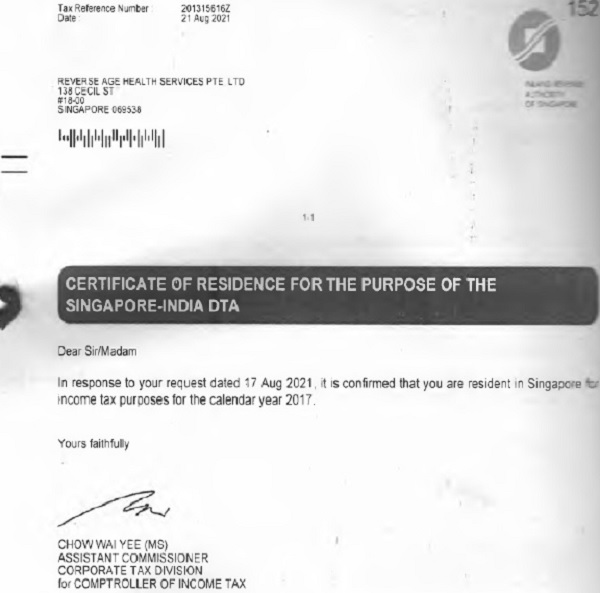
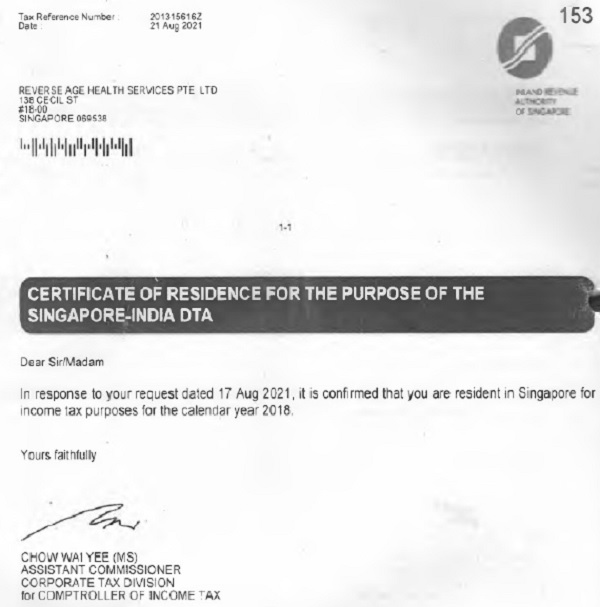
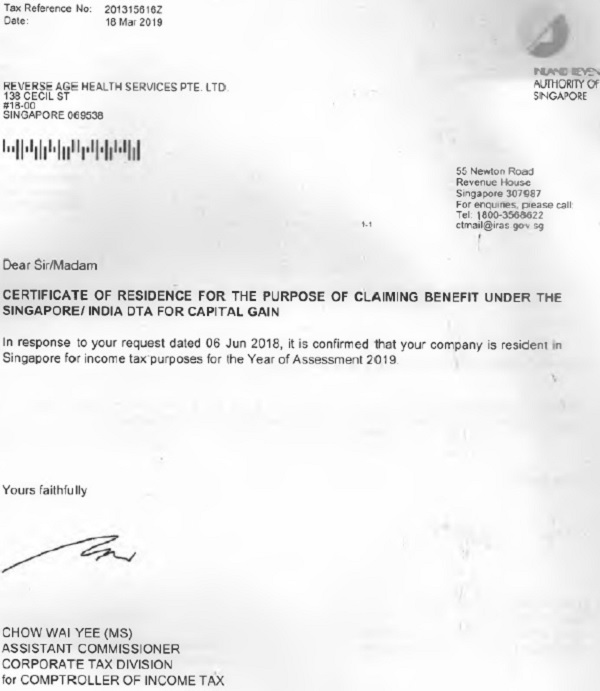
11. In addition to the above the other most important factor which needs special consideration is that the two shares holders namely Sumit Nanda and Shikha Nanda are also residents of Singapore as per the tax residency certificates as under :-
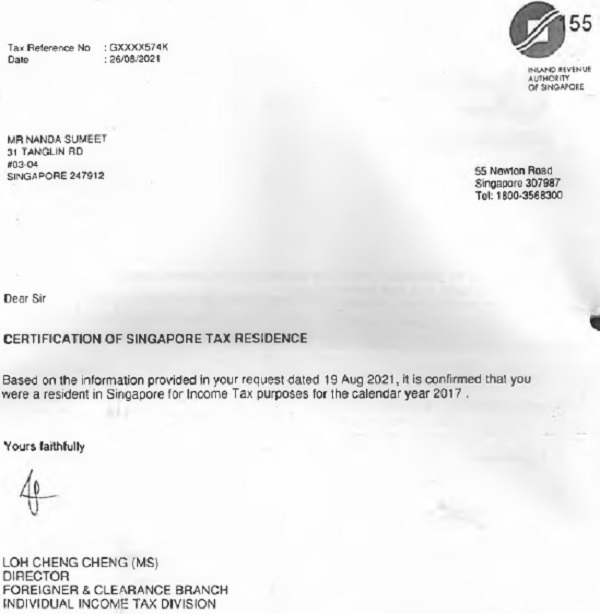
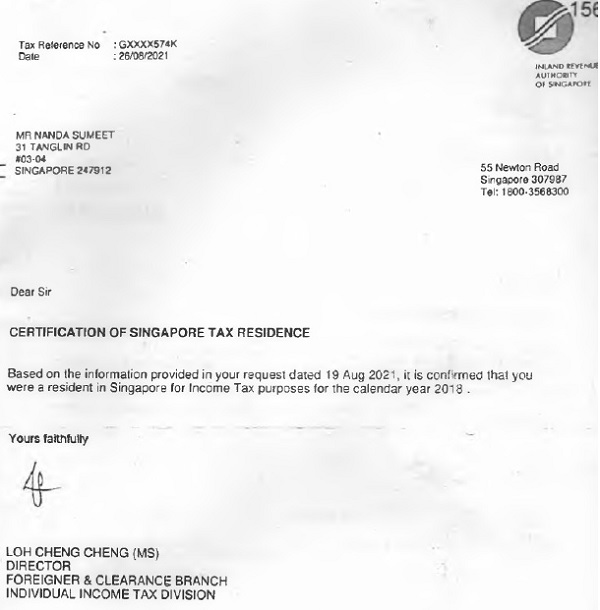
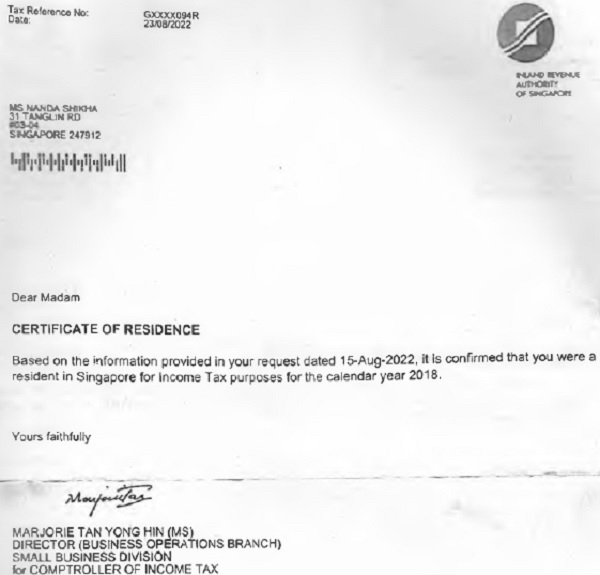
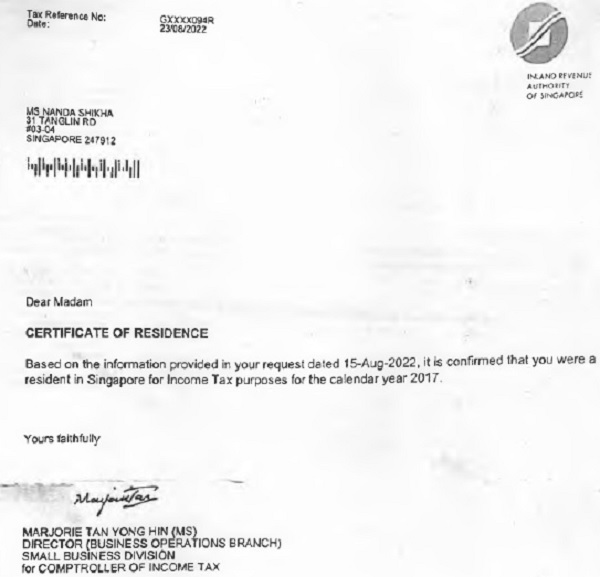
12. Further the assessment orders of Inland Revenue authority of Singapore in the case of the assessee are placed at pages 159 to 167 of the paper book volume one.
13. At this point it has to be understood clearly that the supremacy of law made by the Parliament is beyond any doubt. However, one of the recognised exceptions to the said rule is section 90 (2) of the Act which can be termed as treaty override provision as held by the Hon’ble Supreme Court in the case of Azadi Bachao Andolan (2004) 10 SCC 1 and, therefore, this provision allows the provisions of a DTAA to supersede the provisions of the income tax Act in case their application is more beneficial.
14. There is no dispute that GAAR is applicable to the assessment year under consideration which empowered the revenue to declare the subject transaction to be an impressible arrangement. In our considered opinion this means :-
“an arrangement the main purpose of which is to obtain a tax benefit, and which, inter-alia, is entered into, or carried out by means or in a manner which is not ordinarily employed for bona fide purposes.”
15. However, as per section 101 of the ITA, domestic GAAR cannot be pressed into operation for denial of a tax benefit, where the case of an assessee falls within one of the conditions prescribed under Rule 10U of the IT Rules 1962. Chapter X-A not to apply in certain cases, Rule 10U(1)(a) read as under :-
“an arrangement where the tax benefit in the relevant assessment year arising in aggregate, to all parties to an arrangement does not exceed the sum of Rs.3 crores”.
16. Further Rule 10 U (1) (d) provides :-
“any income accruing or arising to or deemed to accrue arise to or received or deemed to be received by any person from transfer of investments made before the first day of April, 2017 by such person.”
17. In the light of the aforementioned relevant provisions and rules, in the case in hand the short term capital gain is Rs.1,92,63,473/- the tax on which is below the threshold set out in Rule 10 U (1) (a) (supra) further the impugned shares were acquired by the assessee on 22.08.2016 which is prior to the cut off date set out in Rule 10 U (1)(d) (supra).
18. On these undisputed facts it can be safely concluded that assuming domestic GAAR provision are applicable but for the aforestated facts the treaty benefit cannot be denied to the assessee.
19. The AO / DRP have also invoked the doctrine “substance over form” to deny the benefit of Article 13 (4A). In our considered opinion the said doctrine is prior to the codification of domestic GAAR and the legislators were conscious enough when they were providing exemptions under Chapter X-A of the Act.
20. Even the treatment of the assessee company as “Shell” or “conduit” also do not hold any water in as much as the veracity of the expenditure incurred by the assessee in Singapore was a subject matter of tax scrutiny in Singapore and the same has been accepted to be genuine by the Singapore tax authorities as per tax assessment orders mentioned elsewhere.
21. To conclude it is not in dispute that the assessee has furnished a valid tax residency certificate issued by Inland Authority of Singapore, audited financial statements and return of income filed alongwith tax assessment orders by Singapore Tax Authority, therefore, in the light of the binding decision of the Hon’ble Jurisdictional High Court of Delhi in the case of Black Stone Capital Partners (supra) we direct the AO to delete the impugned disallowance and allow the treaty benefit to the assessee as per the relevant provisions of the law/treaty. The grounds addressed before us are allowed.
In the result, the appeal of the assessee is allowed. Order pronounced in the open court on 17.02.2023




